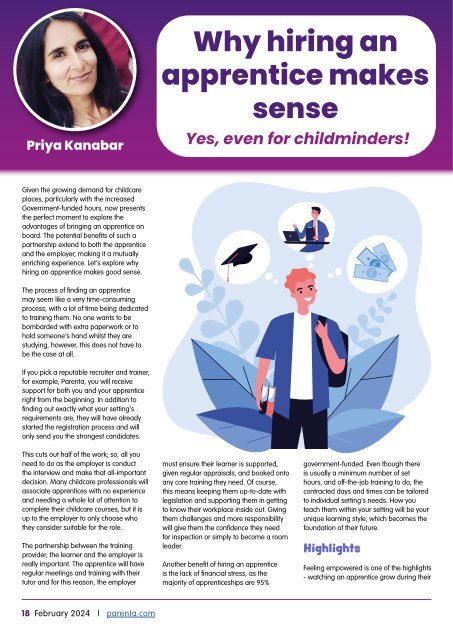February 2024 Parenta magazine_compressed
You also want an ePaper? Increase the reach of your titles
YUMPU automatically turns print PDFs into web optimized ePapers that Google loves.
Priya Kanabar<br />
Why hiring an<br />
apprentice makes<br />
sense<br />
Yes, even for childminders!<br />
Given the growing demand for childcare<br />
places, particularly with the increased<br />
Government-funded hours, now presents<br />
the perfect moment to explore the<br />
advantages of bringing an apprentice on<br />
board. The potential benefits of such a<br />
partnership extend to both the apprentice<br />
and the employer, making it a mutually<br />
enriching experience. Let’s explore why<br />
hiring an apprentice makes good sense.<br />
The process of finding an apprentice<br />
may seem like a very time-consuming<br />
process, with a lot of time being dedicated<br />
to training them. No one wants to be<br />
bombarded with extra paperwork or to<br />
hold someone’s hand whilst they are<br />
studying, however, this does not have to<br />
be the case at all.<br />
If you pick a reputable recruiter and trainer,<br />
for example, <strong>Parenta</strong>, you will receive<br />
support for both you and your apprentice<br />
right from the beginning. In addition to<br />
finding out exactly what your setting’s<br />
requirements are, they will have already<br />
started the registration process and will<br />
only send you the strongest candidates.<br />
This cuts out half of the work; so, all you<br />
need to do as the employer is conduct<br />
the interview and make that all-important<br />
decision. Many childcare professionals will<br />
associate apprentices with no experience<br />
and needing a whole lot of attention to<br />
complete their childcare courses, but it is<br />
up to the employer to only choose who<br />
they consider suitable for the role.<br />
The partnership between the training<br />
provider, the learner and the employer is<br />
really important. The apprentice will have<br />
regular meetings and training with their<br />
tutor and for this reason, the employer<br />
must ensure their learner is supported,<br />
given regular appraisals, and booked onto<br />
any core training they need. Of course,<br />
this means keeping them up-to-date with<br />
legislation and supporting them in getting<br />
to know their workplace inside out. Giving<br />
them challenges and more responsibility<br />
will give them the confidence they need<br />
for inspection or simply to become a room<br />
leader.<br />
Another benefit of hiring an apprentice<br />
is the lack of financial stress, as the<br />
majority of apprenticeships are 95%<br />
government-funded. Even though there<br />
is usually a minimum number of set<br />
hours, and off-the-job training to do, the<br />
contracted days and times can be tailored<br />
to individual setting’s needs. How you<br />
teach them within your setting will be your<br />
unique learning style, which becomes the<br />
foundation of their future.<br />
Highlights<br />
Feeling empowered is one of the highlights<br />
- watching an apprentice grow during their<br />
first year, compile a portfolio of certificates,<br />
from scratch, and gain invaluable (handson)<br />
skills needed to work as an early years<br />
practitioner.<br />
Although it can be challenging knowing<br />
that you, the employer, are responsible for<br />
them, the challenging aspect is motivating.<br />
Making an effort to demonstrate<br />
professional role modelling, naturally sets<br />
a high standard.<br />
Support<br />
The feeling of guiding someone in making<br />
their first steps towards a qualification is<br />
very rewarding, as is knowing you are part<br />
of the reason they are competent. During<br />
that process, providing endless support<br />
and praise to ensure the apprentice does<br />
not lack self-esteem is essential.<br />
It helps to put yourself in their shoes;<br />
taking yourself back to when you first<br />
began training to work in the early years.<br />
Mental health and stress can impact on<br />
the ability to function, let alone work; for<br />
this reason, supporting staff with regular<br />
meetings is essential, especially if you<br />
want to keep staff long term.<br />
Training<br />
Keeping your apprentices informed about<br />
current legislation and providing crucial<br />
refresher training serves as a helpful<br />
reminder for the entire setting to review<br />
their practices. Ensuring apprentices<br />
are well-trained is crucial for meeting<br />
high standards and avoiding any issues<br />
during Ofsted inspections. While there<br />
might be time pressures involved in<br />
training, ultimately, it leads to increased<br />
professionalism, which will be a positive<br />
outcome for all.<br />
There is a sense of pressure in training<br />
someone that can only result in more<br />
professionalism, a positive thing for sure.<br />
Working in the early years requires a<br />
range of personality traits, using creativity<br />
in different ways and a diverse range<br />
of teaching styles. This lesson is a very<br />
special one an employer can teach an<br />
apprentice - to reassure them that they do<br />
not have to fit in, but rather float in their<br />
own bubbles for all to admire.<br />
There are so many benefits to hiring<br />
an apprentice and they outweigh the<br />
hardships!<br />
Scan here for<br />
more information<br />
& resources<br />
from Priya:<br />
18 <strong>February</strong> <strong>2024</strong> | parenta.com<br />
parenta.com | <strong>February</strong> <strong>2024</strong> 19
















